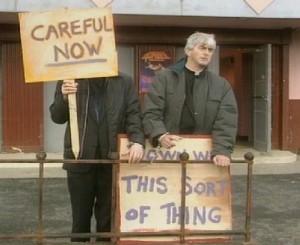
I hate having to take strike action. I hate having to take action short of a strike, which recently involved the highly radical step of, er, working to contract.
I particularly hate it at the moment because tomorrow will be my second anniversary at Nottingham University Business School. I think I’m very lucky to be at a well-run university and in a well-run School. I admire and respect my colleagues, and have no reason to think that that respect isn’t returned. I enjoy my work – challenging enough to stretch me, not so stressful that it might break me. I hope these words won’t come back to haunt me, but for now, I consider myself to be very, very lucky.
So I don’t want to strike. I also don’t want to ‘politicise’ my blog by saying too much about it. Not least because it’s hard to get to the bottom of what’s really going on. I’ve foolishly neglected to become an expert in pensions, and so I don’t fully grasp the issues. I know enough not to take at face value the information that the employers are giving us, nor the information from the UCU. On the one hand, it’s hard not to conclude that (regardless of your personal politics) that the government is doing all kinds of things that it’s secretly wanted to do for ages under the guise of TINA (‘There Is No Alternative’). It’s also hard to avoid the fact that changes were made to our pension scheme not so long ago that were supposed to address the (undoubted) issues of longer life expectancy. So it’s hard not to wonder why we’re back again so soon. And hard not to wonder how long it will be before we’re back revisiting and adjusting again. And again. And again.
There’s something of the theatrical about all of the public posturing and negotiations and the wars of words and the spin that goes on with every industrial dispute. Often I think what’s really going on is not what it seems. “Offers” are made which are intended to be rejected, and in the full knowledge that a better offer will be made after the inevitable industrial action. Unions ask for more than they could possibly expect to get. In the end, we usually end up with an agreement which lets both sides claim victory and appease their constituency. But what we will have tomorrow is a show of the strength of feeling and stomach for a fight. It may or not make any difference in the short term. But in the long term, it sends a clear signal and it will make a difference to the eventual outcome of the war, even if the ‘battle’ is stage managed.
I’d recommend union membership to anyone. If you can join a union, you should. Not only will they represent members’ interests collectively, they’ll also have your back if things go bad and make sure you get due process and fair treatment. If I had a pound for every story I’ve heard about union representation and support making a real difference to how someone is treated, I’d make at least some of the cash back that I’ll lose by striking tomorrow.
